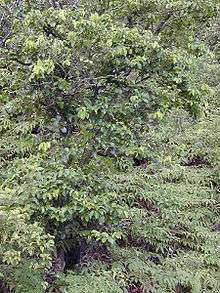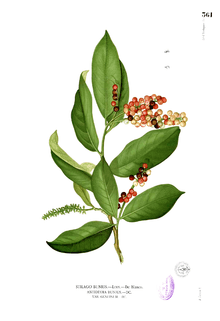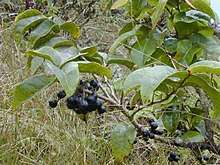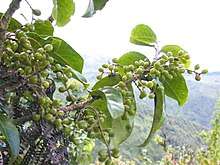Antidesma
Antidesma is a genus of tropical plant in the family Phyllanthaceae formally described by Linnaeus in 1753.[3][1] It is native to tropical Africa, S + E + SE Asia, Australia, and various oceanic islands. The greatest diversity occurs in Southeast Asia.[2][4][5][6]
| Antidesma | |
|---|---|
 | |
| Hame (A. platyphyllum) - habit | |
| Scientific classification | |
| Kingdom: | Plantae |
| Clade: | Tracheophytes |
| Clade: | Angiosperms |
| Clade: | Eudicots |
| Clade: | Rosids |
| Order: | Malpighiales |
| Family: | Phyllanthaceae |
| Subfamily: | Antidesmatoideae |
| Tribe: | Antidesmateae |
| Subtribe: | Antidesmatinae |
| Genus: | Antidesma L. 1753 not Wall. 1832[1] |
| Type species | |
| Antidesma alexiteria | |
| Synonyms[2] | |



Description
Antidesma is a variable genus which may be short and shrubby or tall and erect, approaching 30 metres in height. It has large oval shaped leathery evergreen leaves up to about 20 centimetres long and seven wide. The flowers have a strong, somewhat unpleasant scent. The staminate flowers are arranged in small bunches and the pistillate flowers grow on long racemes which will become the long strands of fruit. The fruits are spherical and just under a centimeter wide, hanging singly or paired in long, heavy bunches. They are white when immature and gradually turn red, then black. When they are still white they have sour and astringent taste, sour taste when they are red and have sweet and sour taste when they are black.
The evergreen (sometimes deciduous) simple leaves have fine hairs and show no glands. They grow in an alternate arrangement, with entire, symmetrical blades. They are connected to the stem with a petiole (leaf stalk) and stipules (appendage at the base of a leaf stalk).
The flowers grow in a raceme, with 1 bract per flower, on a short pedicel (tiny stalk, supporting a single flower). Their color is light yellowish green, but may turn red when mature. These plants are dioecious, i.e. unisexual, with male and female flowers on separate plants. There are 3 to 8 fused sepals, but no petals. The male flowers have 2 to 8 stamens, but no pistils. The female flowers have 2 to 6 stigmas. They have a 1-locular ovary with 2 ovules.
The globose to ellipsoid fruits resemble a drupe. Their color varies from green to white, red and black. The fleshy and juicy fruits are edible with a sour to bitter sweet taste. Some individuals find Antidesma bunius berries to have a bitter taste. Those who detect this bitter taste (about 15% of subjects tested) cannot taste PTC, and similarly those who can taste PTC (about 68% of the subjects) cannot taste any bitterness in Antidesma bunius, while a minority of people cannot taste bitterness in either.[7][8]
Species
Accepted species[2]
- Antidesma acidum - Indian Subcontinent, Indochina, Java, S China
- Antidesma alexiteria - S India, Sri Lanka
- Antidesma ambiguum - Yunnan, Vietnam
- Antidesma annamense - Vietnam
- Antidesma baccatum - New Guinea, Maluku
- Antidesma bhargavae - Andaman & Nicobar
- Antidesma brachyobotrys - Malaysia, Borneo
- Antidesma brevipes - Sulawesi
- Antidesma bunius - Queensland, Christmas I, New Guinea, SE Asia, Indian Sub., China
- Antidesma catanduense - Catanduanes
- Antidesma celebicum - Sulawesi, Timor, Maluku
- Antidesma chalaranthum - Papua New Guinea
- Antidesma chonmon - Yunnan, Vietnam
- Antidesma cochinchinense - Cambodia, S Vietnam
- Antidesma comptum - Tamil Nadu
- Antidesma concinnum - Papua New Guinea
- Antidesma contractum - New Guinea
- Antidesma coriaceum - Malaysia, Sumatra, Borneo, Nicobar Is
- Antidesma costulatum - Sichuan, Yunnan
- Antidesma cruciforme - W Malaysia
- Antidesma curranii - Philippines
- Antidesma cuspidatum - Malaysia, Borneo, Sumatra
- Antidesma dallachyanum - Queensland
- Antidesma digitaliforme - Philippines
- Antidesma eberhardtii - Laos, Vietnam
- Antidesma edule - Philippines
- Antidesma elassophyllum - Viti Levu, Vanua Levu
- Antidesma elbertii - Maluku, Sulawesi, Lesser Sunda Is
- Antidesma erostre - New Guinea, Queensland
- Antidesma excavatum - Borneo, Sulawesi, Maluku, Philippines, Papuasia, Micronesia
- Antidesma ferrugineum - Papua New Guinea
- Antidesma fleuryi - Laos, Vietnam
- Antidesma forbesii - S Thailand, W Malaysia, Sumatra
- Antidesma fordii - Laos, Vietnam, S China
- Antidesma fruticosum - Vietnam
- Antidesma fruticulosum - Myanmar
- Antidesma ghaesembilla - S China, S + SE Asia, Papuasia, N Australia
- Antidesma gillespieanum - Fiji
- Antidemesma hainanense - Laos, Vietnam, S China
- Antidesma helferi - S Myanmar, S Thailand, W Malaysia, N Sumatra
- Antidesma heterophyllum - Java, Lesser Sunda Is, Sulawesi, Maluku
- Antidesma insulare - Viti Levu
- Antidesma japonicum China, Japan, Indochina, Philippines, W Malaysia
- Antidesma jayasuriyae - Sri Lanka
- Antidesma jucundum - Papua New Guinea
- Antidesma × kapuae - South Kona
- Antidesma keralense - Kerala
- Antidesma khasianum - Meghalaya
- Antidesma kunstleri - Perak
- Antidesma laciniatum - W + C + E Africa
- Antidesma laurifolium - Thailand, Cambodia, Johor
- Antidesma leucocladon - S Thailand, W Malaysia, Sumatra
- Antidesma leucopodum - S Thailand, W Malaysia, Sumatra, Borneo, Philippines
- Antidesma macgregorii - Philippines
- Antidesma maclurei - Hainan, Vietnam
- Antidesma madagascariense - Madagascar, Comoros, Mauritius, Réunion
- Antidesma membranaceum - tropical + southern Africa
- Antidesma messianianum - New Caledonia
- Antidesma microcarpum - Philippines
- Antidesma minus - Sumatra, W. Java
- Antidesma montanum - China, S + SE Asia, New Guinea, Queensland
- Antidesma montis-silam - Sabah
- Antidesma myriocarmum - New Guinea
- Antidesma neurocarpum - S Thailand, W Malaysia, Borneo, Sumatra
- Antidesma nienkui - Guangdong, Hainan, N Thailand
- Antidesma nigricans Bhutan, Arunachal Pradesh, Assam, Myanmar
- Antidesma oblongum - Liberia, Ivory Coast
- Antidesma orthogyne - S Thailand, W Malaysia
- Antidesma pachybotryum - Cameroon
- Antidesma pachystachys - W Malaysia
- Antidesma pacificum - Vanua Levu, Moala
- Antidesma pahangense - W Malaysia
- Antidesma parvifolium - Queensland, Northern Territory
- Antidesma pendulum - S Thailand, W Malaysia, Borneo, Sumatra
- Antidesma petiolatum - New Guinea
- Antidesma phanrangense - Vietnam
- Antidesma platyphyllum - Hawaii
- Antidesma pleuricum - Taiwan, Philippines
- Antidesma poilanei - S Vietnam
- Antidesma polystylum - Borneo
- Antidesma pulvinatum - Hawaii[9]
- Antidesma puncticulatum - Sri Lanka, Andaman Is, Indochina, Philippines, Borneo, Sumatra
- Antidesma pyrifolium - Sri Lanka
- Antidesma rhynchophyllum - New Guinea
- Antidesma riparium - Borneo, Sulawesi, Philippines, New Guinea
- Antidesma rufescens - tropical Africa
- Antidesma sinuatum - Queensland
- Antidesma sootepense - Thailand, Yunnan, Laos, Cambodia
- Antidesma spatulifolium - New Guinea, Tanimbar
- Antidesma stipulare - Indonesia, Malaysia, Philippines
- Antidesma subbicolor - Vietnam
- Antidesma subcordatum - Philippines, Lesser Sunda Is
- Antidesma tetrandrum - Andaman & Nicobar, Bali, Java, Sumatra
- Antidesma thwaitesianum - มะเม่า (maa maw); Thailand
- Antidesma tomentosum - Nicobar Is, S Thailand, Malaysia, Indonesia
- Antidesma tonkinense - N Vietnam
- Antidesma trichophyllum - Viti Levu
- Antidesma vaccinioides - Papua New Guinea
- Antidesma velutinosum - E Himalayas, Myanmar, Thailand, Malaysia, W Indonesia
- Antidesma velutinum - Bangladesh, Andaman Is, Indochina
- Antidesma venenosum - Borneo
- Antidesma venosum - Africa, China, Indochina
- Antidesma vogelianum - tropical Africa
Other species
- Antidesma pentandrum - Ryukyu Islands, Taiwan, Philippines
References
- Tropicos, Antidesma L.
- Kew World Checklist of Selected Plant Families
- Linnaeus, Carl von. 1753. Species Plantarum 2: 1027 in Latin
- Govaerts, R., Frodin, D.G. & Radcliffe-Smith, A. (2000). World Checklist and Bibliography of Euphorbiaceae (and Pandaceae) 1-4: 1-1622. The Board of Trustees of the Royal Botanic Gardens, Kew.
- Flora of China Vol. 11 Page 209 五月茶属 wu yue cha shu Antidesma Burman ex Linnaeus, Sp. Pl. 2: 1027. 1753.
- Hoffmann, P. 1999. The genus Antidesma (Euphorbiaceae) in Madagascar and the Comoro Islands. Kew Bull. 54(4): 877–885
- Henkin, R.I. and W.T. Gillis. (1977). Divergent taste responsiveness to fruit of the tree Antidesma bunius Nature:265:536 - 537.
- "Antidesma pulvinatum". Germplasm Resources Information Network (GRIN). Agricultural Research Service (ARS), United States Department of Agriculture (USDA). Retrieved 2009-11-20.